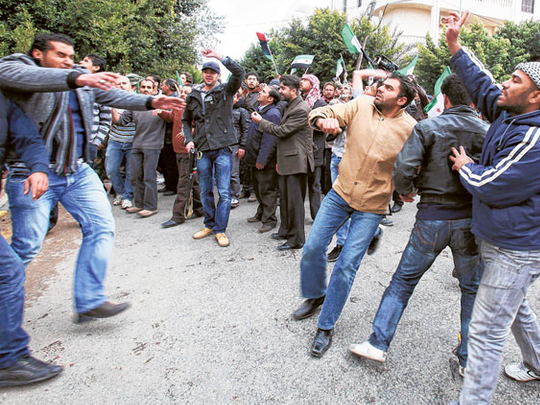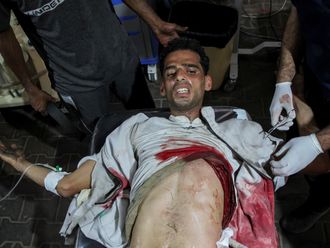
London: Arab and western governments scrabbling to find strategies to deal with the crisis in Syria are considering ways to strengthen opposition to President, Bashar Al Assad, including supporting the Free Syrian Army.
The Russian and Chinese vetoes of a UN security council resolution on Syria have weakened the already bleak prospects for a negotiated end to the uprising.
But western diplomats and analysts warn that sharp divisions in opposition ranks, the strength of the Al Assad regime and the difficulty of mounting covert operations all pose serious further problems.
In Washington, the National Security Council is said to be preparing a "presidential finding", an executive order authorising covert action, as a policy option, but it is not clear whether President Barack Obama would take the risky step of signing it.
Radioactive effects
"It would leak in an instant and it would be radioactive," said Robert Baer, a former CIA officer in the region.
"They [the Obama administration] have no idea of what to do now. They don't want to be behind the ethnic cleansing of the Alawites, and it would have an explosive effect in Lebanon."
Al Assad is from Syria's minority Alawite sect.
Britain and France both secretly sent special forces to train Libyan rebels last year but look unlikely to repeat the tactic in Syria.
Any outside involvement in Syria would also have "an Arab face", said a former British intelligence officer.
The most significant outside player would probably be neighbouring Turkey, which already hosts the opposition Syrian National Council and allows a safe haven for the Free Syrian Army (FSA), whose lightly armed fighters are in action against regime forces.
Emile Hokayem, Middle East analyst at the International Institute of Strategic Studies (IISS), in London, said: "Whether the Turks are confident with that role, and how overt or covert it is, are key considerations."
Sinan Ülgen, a former Turkish diplomat now at the Carnegie Endowment for International Peace, said Ankara's preferred option would be regional support for limited Nato operations, including a no-fly zone and humanitarian corridor.
"Turkey is beyond the point of no return," he said. "It has burnt its bridges. The longer Al Assad stays in Syria, the worse it is. Turkey has bet heavily on regime change."
Smuggling challenges
Qatar and Saudi Arabia are believed to have been financing the FSA, but Baer said the FSA was having problems smuggling heavy and sophisticated arms into the country.
Hokayem predicted support for the FSA would now increase, but warned that a lack of coordination between the Gulf states risked leading to the rise of competing militias. Efforts to persuade the fractured Syrian opposition to close ranks are likely to take precedence over any clandestine activity, not least because an EU arms embargo bans any weapons supplies.
Ben Barry, an IISS military expert, said any assessment of the FSA would conclude that its most urgent need was for secure communications. Its fighters currently used mobile phones with Syrian numbers, which were easily monitored by the government, he said
— Guardian News & Media Ltd












